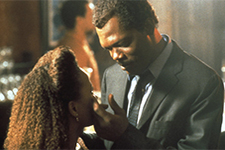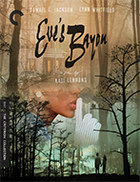Eve's Bayou (4K UHD)
|  Eve’s Bayou is a Southern Gothic potboiler made with uncommon grace and artistry and emotion. It was the writing and directing debut of Kasi Lemmons, who had found success throughout the 1990s acting in supporting roles in a number of major films, including Jonathan Demme’s The Silence of the Lambs (1990) and John Woo’s Hard Target (1993). But, she had always wanted to be a writer, and once she was able to generate interest in her script for Eve’s Bayou, which drew heavily on her own childhood memories, she insisted that she be allowed to direct it, as well—a bold, but essential move on her part given the reluctance of the major studios to hand filmmaking power over to black women. She had to make a short proof-of-concept film for producer Caldecott Chubb, who had previously produced Charles Burnett’s To Sleep With Anger (1990) and Danny DeVito’s Hoffa (1992), and it won him over. The film centers on 10-year-old Eve Batiste (Jurnee Smollett), who lives in a small town in rural Louisiana in the 1950s or ’60s. She is named for an ancestor who was supposedly clairvoyant, which immediately introduces an element of the supernatural that hovers throughout the film. Eve has a younger brother, Poe (Jake Smollett), and an adolescent sister, Cisely (Meagan Good), and they live in a large house with their father, Louis (Samuel L. Jackson), who is a local physician, the kind who still makes house calls, and their mother, Roz (Lynn Whitfield). However, despite Roz’s undeniable grace and beauty, Louis is an unrepentant womanizer who cannot resist the lure of other women, much to the chagrin of his sister, Mozelle (Debbi Morgan), who works as a psychic and lives with them, along with their grandmother (Ethel Ayler). Eve is an innocent, truly childlike in her wonder and curiosity and also in her inability to fully grasp the world around her, especially the world of adults. This is epitomized in an early scene in which she and her siblings mill about their family house during a large party, which is interlaced with suggestions of Louis’s infidelity and various tensions among the adult characters. This comes to a head when Eve witnesses (or thinks she witnesses) a sexual interlude in the carriage house between her father and Matty Mereaux (Lisa Nicole Carson), the wife of one of his best friends (Roger Guenveur Smith). This is the first of many events that Lemmons treats with ambiguity due to a character’s compromised perception, questionable memory, or outright lies. She shows us things throughout the film as if they happened in a certain way, only to later reveal that what we assumed to be the “truth” may actually be a misperception or a lie. Cisely, who is enamored with their father, insists that Eve must have misperceived what happened, although she is later the victim of what appears to be an incestuous advance by Louis, which ruptures her relationship with everyone around her. Similarly, when Roz hears her fortune from Elzora (Diahann Carroll), a local voodoo practitioner whose abilities Mozelle doubts, she becomes convinced that her children are in danger and insists on making them literal prisoners in their house, lest they go outside and tempt fate. Eve’s Bayou is anchored by fine performances by a wide-ranging cast of skilled actors and moody, evocative cinematography by Amy Vincent, who, like Lemmons, was making her feature debut (she would go on to shoot numerous features, including Craig Brewer’s Hustle & Flow and Black Snake Moan). Lemmons finds consistently fascinating ways to interweave the past and the present, the subjective and the objective, such as her decision to literally place Eve and Cisely in the carriage house as Cisely explains what she thinks happens there and staging a character’s tense, potentially bloody flashback in a mirror so that it appears that the character having the memory is watching it unfold behind her. The plot in Eve’s Bayou is both complex and engaging, drawing us into the smoldering, simmering world of the Batiste family and their twisted dynamics without turning them into Gothic grotesquerie. If anything, Lemmons proves herself to be an apt chronicler of flawed, but intriguing characters whose humanity remains fully intact despite their myriad shortcomings (especially their need to convince themselves of certain truths to maintain their own worldviews). As a film written and directed by a black woman, it is not surprising that it centers on strong black women, although Lemmons leaves plenty of room to explore their weaknesses—Roz’s willingness to look the other way to maintain the family, which is aided and abetted by Mozelle; Cisely’s selfishness; and Eve’s insecurities. Even Samuel L. Jackson’s Louis, who is egotistic and quite possibly incestuous, maintains a human face throughout (Jackson’s work here is admirably subtle, especially given his penchant for playing aggressive, verbose characters). Not everything in the film can be taken at face value, and certain ambiguities persist even after seemingly clear explanations have been proffered, but that is precisely what keeps the film so absorbing.
Copyright © 2022 James Kendrick Thoughts? E-mail James Kendrick All images copyright © The Criterion Collection | |||||||||||||||||||||||||||||
Overall Rating: 


 (3.5)
(3.5)


